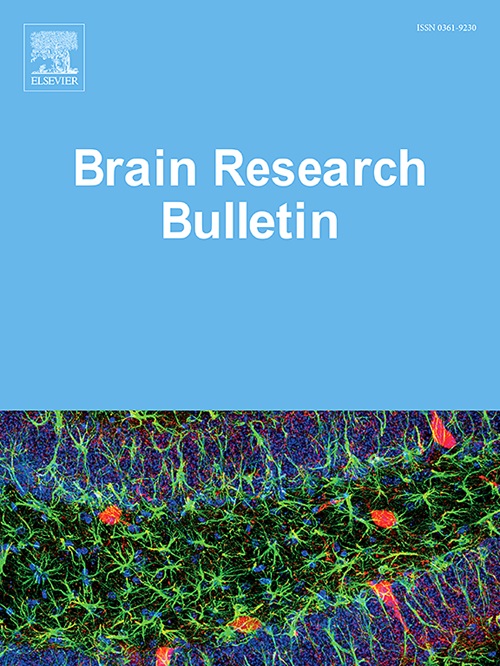Daphnetin 对小鼠脑缺血模型中海马神经元和血脑屏障完整性的神经保护作用
IF 3.5
3区 医学
Q2 NEUROSCIENCES
引用次数: 0
摘要
本研究旨在评估不同剂量的水飞蓟素(DAP,一种从香豆素中提取的天然化合物)对脑缺血小鼠模型中海马神经元损伤、神经行为功能、血脑屏障(BBB)完整性、Claudin-5、脑源性神经营养因子(BDNF)、超氧化物歧化酶(SOD)和炎症标志物表达的影响。通过30分钟的双侧颈总动脉闭塞(BCCAO)诱导小鼠脑缺血,然后再灌注48小时。使用甲酚紫染色法评估海马神经元的存活率,并通过测量伊文思蓝(E.B)染料的渗漏来确定 BBB 的功能。空间记忆测试采用径向臂水迷宫(RAWM)任务。免疫荧光法测定了Claudin-5和BDNF,而SOD、白细胞介素-1β(IL-1β)和核因子-κB(NF-κB)的表达则通过Western印迹法测定。给药 DAP 能明显提高海马 CA1、CA3 和齿状回(DG)区域神经元的存活率,并能剂量依赖性地改善空间记忆(P<0.05)。本文章由计算机程序翻译,如有差异,请以英文原文为准。
Neuroprotective effects of Daphnetin on hippocampal neurons and blood-brain barrier integrity in a mouse model of cerebral ischemia
The purpose of this research was to assess the impact of different doses of Daphnetin (DAP, a natural compound derived from coumarin) on hippocampus neuronal injury, neurobehavioral function, blood-brain barrier (BBB) integrity, expression of claudin-5, brain-derived neurotrophic factor (BDNF), superoxide dismutase (SOD), and inflammatory markers in a mouse model of cerebral ischemia. Cerebral ischemia was induced in mice through 30 minutes of bilateral common carotid occlusion (BCCAO), followed by 48 hours of reperfusion. The viability of hippocampal neurons was assessed using Cresyl violet staining and BBB function was determined by measuring Evans blue (E.B) dye leakage. Spatial memory was tested using the Radial Arm Water Maze (RAWM) task. Claudin-5 and BDNF were measured by immunofluorescence, while SOD, interleukin-1 beta (IL-1β), and nuclear factor-κB (NF-κB) expression were determined through western blotting. Administering DAP significantly increased neuron survival in the hippocampus CA1, CA3, and dentate gyrus (DG) regions and improved spatial memory dose-dependently (P<0.0001). Treatment with DAP (40 mg/kg IP) significantly reduced E.B leakage and brain water content (P<0.001). Furthermore, it increased the claudin-5, BDNF, and SOD levels and diminished NF-κB and IL-1β expression (P<0.0001). The research found that DAP protected neurons in the CA1, CA3, and DG areas of the hippocampus, enhanced behavioral functions, and preserved BBB integrity in a cerebral ischemia model. This positive impact is achieved by increasing the expression of claudin-5, BDNF, and SOD and diminishing neuroinflammation. Further research is required to clarify the mechanisms and possible clinical uses.
求助全文
通过发布文献求助,成功后即可免费获取论文全文。
去求助
来源期刊

Brain Research Bulletin
医学-神经科学
CiteScore
6.90
自引率
2.60%
发文量
253
审稿时长
67 days
期刊介绍:
The Brain Research Bulletin (BRB) aims to publish novel work that advances our knowledge of molecular and cellular mechanisms that underlie neural network properties associated with behavior, cognition and other brain functions during neurodevelopment and in the adult. Although clinical research is out of the Journal''s scope, the BRB also aims to publish translation research that provides insight into biological mechanisms and processes associated with neurodegeneration mechanisms, neurological diseases and neuropsychiatric disorders. The Journal is especially interested in research using novel methodologies, such as optogenetics, multielectrode array recordings and life imaging in wild-type and genetically-modified animal models, with the goal to advance our understanding of how neurons, glia and networks function in vivo.
 求助内容:
求助内容: 应助结果提醒方式:
应助结果提醒方式:


